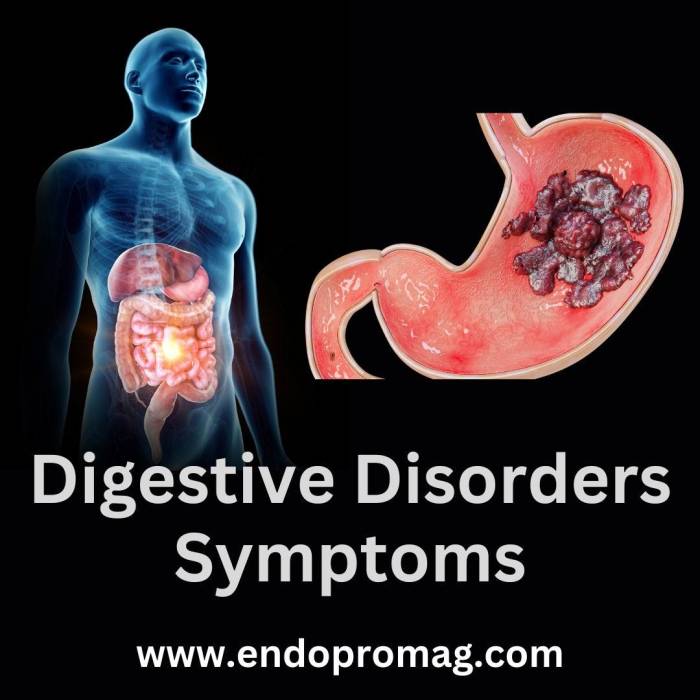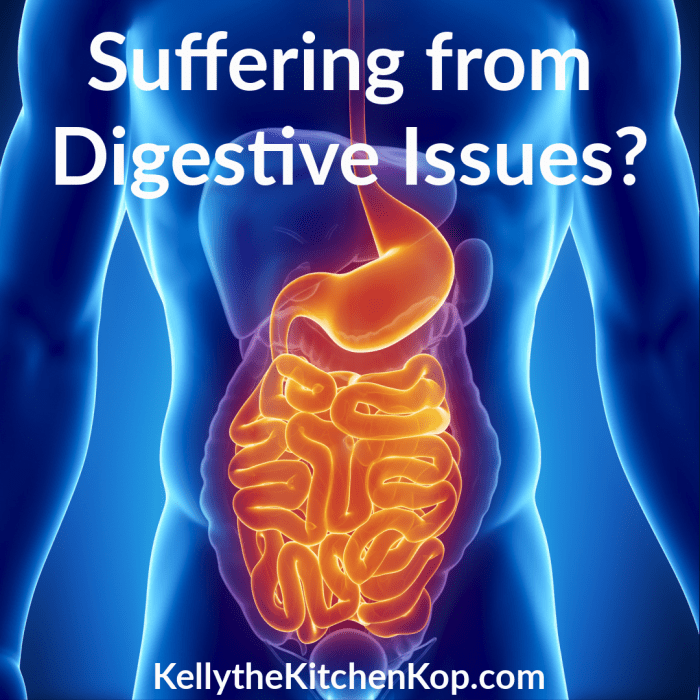Digestive issues are incredibly common, impacting millions and significantly affecting quality of life. Understanding the root causes of discomfort like bloating, constipation, diarrhea, acid reflux, and irritable bowel syndrome (IBS) is crucial for effective management. This guide provides a clear path to identifying these six common digestive problems, empowering you to seek appropriate care and improve your overall well-being. We will explore the characteristic symptoms of each condition, delve into potential causes, and Artikel when professional medical advice is necessary. This information is intended for educational purposes and should not replace consultation with a healthcare professional.
We’ll examine the role of diet, stress, and gut health in digestive function. We will also differentiate between conditions such as lactose intolerance and celiac disease, highlighting the importance of accurate diagnosis for effective treatment. Finally, we’ll discuss various diagnostic tests and treatment options available, emphasizing the importance of a proactive approach to maintaining a healthy digestive system.
Identifying Symptoms of Common Digestive Issues

Understanding the symptoms of common digestive problems is crucial for seeking appropriate medical attention and managing your condition effectively. Recognizing these symptoms allows for early intervention, potentially preventing complications and improving overall well-being. This section will Artikel the characteristic symptoms of several prevalent digestive issues, offering insights into their potential causes and simple self-care measures.
Bloating Symptoms
Bloating, a common digestive complaint, is characterized by a feeling of fullness or tightness in the abdomen. Its severity and duration vary greatly depending on the underlying cause. Some individuals experience mild, intermittent bloating, while others face significant discomfort for extended periods. The following table summarizes key aspects of bloating:
| Symptom | Potential Causes | Self-Care Measures | Severity & Duration |
|---|---|---|---|
| Abdominal distension | Gas, food intolerance, constipation, IBS | Avoid gas-producing foods, increase fiber intake gradually | Mild to severe; intermittent to chronic |
| Feeling full | Overeating, slow digestion, fluid retention | Eat smaller, more frequent meals, stay hydrated | Mild to moderate; varies with meal intake |
| Abdominal pain or cramping | Gas buildup, inflammation, intestinal issues | Gentle exercise, over-the-counter pain relievers (as directed) | Mild to severe; can be intermittent or persistent |
| Visible abdominal swelling | Fluid retention, severe constipation, underlying medical conditions | Consult a doctor for diagnosis and treatment | Moderate to severe; may be persistent |
Constipation and Diarrhea Symptoms
Constipation and diarrhea represent opposite ends of the bowel movement spectrum. Understanding their distinguishing characteristics is vital for accurate self-assessment and appropriate management.
Distinguishing characteristics of constipation include:
- Infrequent bowel movements (less than three per week)
- Hard, dry stools that are difficult to pass
- Straining during bowel movements
- Feeling of incomplete evacuation
- Abdominal discomfort or pain
In contrast, diarrhea is characterized by:
- Loose, watery stools
- Increased frequency of bowel movements
- Urgent need to defecate
- Abdominal cramping or pain
- Possible nausea and vomiting
Acid Reflux Symptoms
Acid reflux, also known as heartburn, occurs when stomach acid flows back into the esophagus. Symptoms range in frequency and intensity. Some individuals experience occasional mild heartburn, while others suffer from frequent, severe episodes. Common symptoms include a burning sensation in the chest, a sour taste in the mouth, and difficulty swallowing. Lifestyle changes such as maintaining a healthy weight, avoiding trigger foods (e.g., spicy foods, caffeine, alcohol), eating smaller meals, and elevating the head of the bed can often alleviate symptoms.
Irritable Bowel Syndrome (IBS) Symptoms
Irritable bowel syndrome (IBS) is a chronic condition characterized by abdominal pain, cramping, and altered bowel habits. Symptoms can vary widely between individuals, and the severity and frequency of symptoms can fluctuate. Many individuals with IBS experience alternating periods of constipation and diarrhea, often accompanied by abdominal bloating and gas. The diagnostic process for IBS typically involves excluding other conditions through a combination of physical examination, review of symptoms, and possibly further investigations such as stool testing.
IBS Diagnostic Flowchart
The following flowchart illustrates a simplified representation of the diagnostic process for IBS:
(Note: This is a simplified representation. A proper diagnosis requires a consultation with a healthcare professional.)
Start → Symptoms (abdominal pain, altered bowel habits) present? → Yes: → Rule out other conditions (e.g., celiac disease, inflammatory bowel disease) through physical exam and testing? → Yes: → IBS diagnosis considered → No: → Further investigation needed → End
No: → IBS unlikely → End
Understanding the Causes of Digestive Problems

Digestive problems stem from a complex interplay of factors, ranging from dietary choices and stress levels to underlying medical conditions and the composition of our gut microbiome. Understanding these causes is crucial for effective management and prevention.
Factors Contributing to Indigestion
Indigestion, characterized by discomfort in the upper abdomen, can arise from various sources. The following table summarizes key contributing factors:
| Dietary Habits | Stress Levels | Underlying Medical Conditions |
|---|---|---|
| Overeating, consuming fatty or spicy foods, excessive caffeine or alcohol intake, and food intolerances can all trigger indigestion. Rapid eating habits also contribute to digestive distress. | Stress hormones can disrupt the normal functioning of the digestive system, leading to slowed digestion and increased discomfort. Chronic stress exacerbates these issues. | Conditions such as gastroesophageal reflux disease (GERD), peptic ulcers, and hiatal hernias can directly cause or worsen indigestion. |
The Role of Gut Bacteria in Digestive Health
The gut microbiome, a complex ecosystem of bacteria, fungi, and other microorganisms residing in the digestive tract, plays a vital role in overall health, including digestive function. A balanced gut microbiome, rich in diverse beneficial bacteria, aids in digestion, nutrient absorption, and immune system regulation. Conversely, an imbalanced microbiome, often characterized by an overgrowth of harmful bacteria or a lack of beneficial species (dysbiosis), can contribute to various digestive problems, including bloating, gas, diarrhea, and constipation. Maintaining a balanced microbiome through a healthy diet, prebiotics, and probiotics is essential for optimal digestive health.
Lactose Intolerance and Celiac Disease: A Comparison
Lactose intolerance and celiac disease are both digestive disorders affecting the small intestine, but their underlying mechanisms and symptoms differ significantly. Lactose intolerance results from a deficiency in lactase, the enzyme responsible for breaking down lactose (milk sugar). This leads to undigested lactose fermenting in the gut, causing symptoms like bloating, gas, and diarrhea. Celiac disease, on the other hand, is an autoimmune disorder triggered by gluten consumption. Gluten consumption damages the villi, the finger-like projections in the small intestine responsible for nutrient absorption, leading to malabsorption, diarrhea, weight loss, and other systemic symptoms. While both conditions can cause digestive discomfort, celiac disease is far more serious and requires a lifelong gluten-free diet.
Common Food Sensitivities and Their Impact on Digestion
Food sensitivities, often distinct from allergies, involve adverse reactions to specific foods that don’t trigger a full-blown allergic response. These sensitivities can cause a range of digestive symptoms, including bloating, gas, abdominal pain, and diarrhea. Common examples include sensitivities to gluten (even in individuals without celiac disease), dairy (in individuals with non-lactose intolerance sensitivities), and certain food additives. The impact on the digestive system varies depending on the specific food and individual sensitivity, but often involves inflammation and impaired digestion. Identifying and eliminating trigger foods is crucial for managing symptoms.
Seeking Professional Medical Advice & Treatment Options

Experiencing persistent or worsening digestive issues can be concerning, and seeking professional medical advice is crucial for accurate diagnosis and effective treatment. Ignoring symptoms can lead to complications, so understanding when to seek help and the available treatment options is vital for managing your digestive health.
When to Seek Medical Attention
Several warning signs indicate the need for immediate medical attention. Prolonged or severe symptoms should not be ignored. Delaying treatment can potentially worsen the condition and complicate recovery. It’s essential to prioritize your health and seek professional help when necessary.
- Persistent abdominal pain, especially if severe or accompanied by fever.
- Unexplained weight loss or unintentional changes in bowel habits.
- Bloody or black stools (melena).
- Vomiting blood or coffee-ground-like material (hematemesis).
- Difficulty swallowing (dysphagia).
- Persistent nausea and vomiting.
- Yellowing of the skin or eyes (jaundice).
Diagnostic Procedures for Digestive Issues
A healthcare professional will use various diagnostic procedures to determine the underlying cause of digestive problems. These tests help identify the specific issue and guide the development of a personalized treatment plan. The choice of tests will depend on the individual’s symptoms and medical history.
- Blood Tests: These can assess overall health, detect inflammation, identify infections, and check liver function. For example, a complete blood count (CBC) can reveal anemia, while liver function tests (LFTs) can assess liver health, crucial for conditions like liver disease affecting digestion.
- Stool Tests: These analyze stool samples for infections, parasites, blood, and other abnormalities. A stool culture can identify bacterial or parasitic infections, while a fecal occult blood test can detect hidden blood, suggesting potential bleeding in the digestive tract.
- Imaging Studies: These techniques provide visual representations of the digestive system. Examples include X-rays (abdominal X-ray to assess for blockages), endoscopy (colonoscopy to visualize the colon), and CT scans (abdominal CT scan to assess organs and structures).
Treatment Options for Digestive Problems
Treatment approaches vary depending on the specific diagnosis. Often, a combination of strategies is employed to achieve optimal results. It’s important to discuss potential side effects with your doctor before starting any treatment.
| Treatment | Potential Side Effects |
|---|---|
| Medication (e.g., antacids, probiotics, antispasmodics, antibiotics) | Nausea, diarrhea, constipation, abdominal discomfort. Specific side effects vary greatly depending on the medication. |
| Dietary Changes (e.g., eliminating trigger foods, increasing fiber intake) | May initially cause digestive upset as the gut adjusts. Nutrient deficiencies possible if not carefully managed. |
| Lifestyle Modifications (e.g., stress management techniques, regular exercise) | May require significant effort and commitment. Lack of adherence can limit effectiveness. |
Maintaining a Healthy Lifestyle for Digestive Health
A healthy lifestyle plays a significant role in preventing and managing digestive problems. These habits contribute to overall well-being and can reduce the risk of developing digestive disorders.
- Balanced Diet: Consume a diet rich in fruits, vegetables, and whole grains. Limit processed foods, excessive fats, and sugary drinks.
- Regular Exercise: Physical activity promotes gut motility and overall health. Aim for at least 30 minutes of moderate-intensity exercise most days of the week.
- Stress Management: Chronic stress can negatively impact digestive health. Practice stress-reduction techniques such as yoga, meditation, or deep breathing exercises.
Final Review

Successfully navigating the complexities of digestive health requires a multifaceted approach. By understanding the symptoms, causes, and available diagnostic tools for common digestive problems, you can take a proactive role in managing your health. Remember that while self-care measures can be helpful, seeking professional medical advice is crucial when experiencing persistent or severe symptoms. Prioritizing a healthy lifestyle through balanced nutrition, regular exercise, and stress management is essential for long-term digestive well-being. Taking charge of your digestive health empowers you to live a more comfortable and fulfilling life.